- Home
- Will Hobbs
Ghost Canoe Page 8
Ghost Canoe Read online
Page 8
“You’re telling me it wasn’t you who took it today?”
“I swear, Captain Bim—it wasn’t me!”
The trader gasped for air, and then took several more deep breaths. He stared long and hard into Nathan’s eyes, and then he seemed calmer. “I want to believe you…. You always seemed like a decent fellow, of upstanding stock…. But who, then?”
“I don’t know. I really don’t know!”
“I suppose it could have been Dolla Bill. I’ve been wondering if he’s been stealing from the store, and I suspect he has. I suppose he’s been skulking around in the dark and saw me moving the box. It’s my own fault for drawing so much attention to myself. Ever since that time you surprised me, I’ve moved it every night! I was just so afraid, and I knew someone was watching me. I could feel it! Sometimes I moved it twice in one night!”
“No wonder you’ve been so tired. Are any of the coins marked? Dolla Bill might spend one.”
“No, they’re not marked!” the trader bellowed. “Clever boy, you always have a suggestion, don’t you?”
Nathan saw the rage suddenly return to the trader’s face, and he knew the man was deadly serious. He saw the shape of the revolver as Captain Bim took it from inside his coat. It was pointed at Nathan’s heart.
“Trying to throw the blame onto that pathetic outcast…You’re a clever liar, boy! You’re the one who saw the box! Swear on your mother’s soul, Red, that it wasn’t you. Swear she’ll be damned for eternity if you’re lying.”
Nathan swore, in a calm voice, on his mother’s soul.
To his relief, Captain Bim believed him.
The trader collapsed on a chair. He took off his cap and crushed it between his hands. “Keep your friends close, and your enemies closer, they always say. I’ll watch Dolla Bill like a hawk! I’ll have his liver!”
“I’m sorry this happened to you, Captain Bim. I feel awful.”
“I’m lost now, Young Mac. If it had been you, I’d have had a chance of getting it back.”
“Tell the territorial marshal.”
“I can’t. I’m going to have to sell the trading post. If news of this got out, it would cripple my bargaining position. People would think me desperate. Promise you won’t tell.”
“I promise.”
Nathan had another secret to keep.
12
The Arrival of the Nitinats
Nathan was sitting on the front stoop of the cottage, looking out to sea, when he first saw them, far off in the waters of the Strait. He studied the shimmering shapes, trying to figure out what they could be. For a long time they appeared to be sea serpents, twenty or more sea serpents lifting their tall heads above the waters.
They were nearing Neah Bay, very gradually nearing. Suddenly he recognized them for what they were—high-prowed, very large canoes. Then he remembered that this was the day that the Makahs’ distant relations from the west coast of Vancouver Island were arriving for the big potlatch. Jefferson was celebrating an event in his family; a marriage, Nathan thought it was.
Even from a mile away, Nathan could see that large numbers of Makahs were gathering on the beach to welcome the Nitinats. He called to his mother, and she came out of the cottage to watch the flotilla of canoes approaching. “Let’s go see the welcome together,” she said.
It proved a pageant Nathan would never forget. Long before any faces were visible in the canoes, there came the beat of drums across the water, to which the Makah responded in kind. At last the two canoes in the lead, and their occupants, began to take shape. Dancing on a plank across the gunwales just behind the prow of one canoe, a grizzly bear was raking the air with one paw and then the next. “Surely it’s a man inside a bear skin,” Elizabeth MacAllister whispered, but the deception was so complete that Nathan had to wonder for a moment.
A man-sized raven with a bill nearly three feet long was dancing at the prow of the other lead canoe. Wings, shaggy throat feathers, and body feathers completed the mischievous caricature suggested by the carved black mask.
From the corner of his eye, Nathan noticed that Bim, at the rear of the crowd on the beach, was watching as well. Earlier in the summer, Nathan would have gone to him to hear his comments. Nearly two weeks had passed since Bim had accused him of stealing all his money, and still it was difficult to be around the trader. They both knew they were avoiding each other; the feelings between them were much too strong. He hadn’t even asked Bim what he thought when the Makahs reported another fishing canoe missing just two days after Bim’s money was stolen.
As the high-prowed canoes of the visitors hovered on the swell just outside the breaking waves, the Makahs sang a welcome song. The visitors responded by removing their paddles from the water and resting them upright on the gunwales of the canoes, blades in the air. There were no fishing canoes here; these were the great canoes, every one. Each canoe carried upward of fifteen men, women, and children.
Holding a carved staff, a white-haired chief at the stern of the grizzly canoe stood and made a speech, which was answered by one from the hyas tyee of the Makahs, old Jefferson, who was clutching a similar emblem of his office.
As soon as the people disembarked and the canoes were unloaded and skidded above the high-tide line on the beach, a parade ensued, with the Makahs and their visitors walking up and down the beach in all their finery and singing. Like many of the women, Rebecca wore a dress fashioned from a red blanket and festooned with white buttons. Lighthouse George, in addition to a grand red cape, was wearing a three-piece suit with abalone buttons that matched the abalone earrings he wore for the occasion.
The parade was followed by canoe races to Waadah Island and back, with bets of jewelry and blankets being placed all during the race. Four canoes from each tribe, seven men pulling plus the rudder paddler, raced to Waadah Island and back. Dolla Bill had tried to enlist for each of the four Makah canoes, including Lighthouse George’s, and had been turned down by every one. “Don’t feel bad,” Nathan told him as the race began.
“Poor Dolla Bill,” he said. “Poor Dolla Bill. George feed me, but George don’t love me. Captain Bim, same, same.”
Nathan knew that what Dolla Bill had said was true. But he wanted to console the outcast, even if he might be a thief. “I didn’t even try to join George’s canoe,” Nathan said. “We’re not as strong as those men—look at the size of their backs. George wants to win.”
Dolla Bill’s face contorted with anger. “Strong as two men!” he declared.
It occurred to Nathan that Dolla Bill should be acting differently in some way if he actually was in possession of a boxful of gold coins. If he really had all that money, wouldn’t it show?
The outcast watched the entire race with keen attentiveness. Competition was fierce as the canoes neared the beach, and Dolla Bill took to jumping up and down like a frenzied dog on a short leash. It was a Makah canoe, though not George’s, that won by a mere prow’s length at the very last.
An announcement was made by one of the Makah chiefs, and everyone went streaming toward the carved doorposts of the Potlatch House, the largest of the longhouses. Nathan’s mother, who was tired and heading home, suggested he go see what happened next, so he would be able to tell her all about it.
More people crammed inside the Potlatch House than Nathan would have thought humanly possible. Inside, a feast was laid out, with Makah delicacies including kelp leaves upon which herring had laid their eggs, octopus stew, and fermented salmon eggs that had the consistency of cheese. People washed down their meat and fish—dried, smoked, roasted, and boiled—with quantities of eulachon oil. For himself, Nathan gorged on pilot bread, which he lathered with blackstrap molasses.
When the people were done eating, everyone turned toward one end of the hall, where all manner of goods were arrayed beside Jefferson, who began to give them away to his guests: blankets, clothes, bentwood cedar boxes filled with eulachon oil and seal oil, baskets, cedar household implements, bows and arrows, harpoons, length
s of fishing and sealing line, halibut hooks, sealskins, bearskins, woven mats, carved totems, a barrel of raw sugar and one of molasses, plug tobacco…anything and everything.
Nathan stayed awake through the first dances of the mythical figures in carved and painted masks, but he didn’t understand the stories the dances were telling, and he was no longer able to keep his eyelids apart. He was awakened much later by the excitement of the crowd. A man on the platform where the dancers had performed was twirling a musket around his body faster than the eye could see. Limber as a snake and all muscle, the man had shaved his head and painted his body a reddish yellow from the waist up. In the light of the longhouse torches, his body glowed as if on fire.
To the amazement of the crowd, the performer began to juggle three long-bladed knives. The juggler’s eyes never followed the knives; they stared straight ahead all the while. Nathan recognized those eyes, and then the pockmarks showing from under the paint. It was Dolla Bill.
Setting two of the knives aside, Dolla Bill appeared to swallow the third, then drew it back out of his throat. His entire audience gasped in appreciation.
The outcast had become the center of attention, glorying in it, and he was only getting started. Dolla Bill shattered a piece of glass, then ate it, after which he drew an endless stream of paper out of his mouth. He rolled a cannonball around his shoulders and along his arms, as if it weighed nothing. Returning to the stage, he ended the night by eating fire from one of the longhouse torches, then breathing it back out as a dragon might, in an explosive burst of flame.
“Skookum-man,” people were whispering as they left the Potlatch House.
“Obviously,” Bim explained, “Dolla Bill has worked in Barnum’s circus somewhere. But I’ve never seen the equal of his performance. He truly is a skookum-man, a demon as well as a thief.”
Nathan was reminded of another skookum-man. “Strong as ten men,” Dolla Bill had described the phantom. “Swims like a fish.” What had become of him?
He’d paddled away, Nathan had to concede, escaped by sea. Now he would never be able to prove the fugitive really existed, that the phantom hadn’t been, as everyone said, a product of his imagination.
13
The Bone Game
Around noon on the second day of the potlatch, the Anna Rose appeared offshore on its weekly rounds. Nathan barely noticed the canoes paddling out to meet the steamer and returning. He was absorbed with the progress of a gambling game between the Makahs and the Nitinats that was being played on the beach above the high-tide line.
A line of Makah men was sitting cross-legged opposite a line of Nitinat men, with about twenty feet separating the opposing players. Lighthouse George had a bone cylinder hidden in each of his hands, virtually identical to the ones Nathan had seen in the small cedar box in the ghost canoe. One cylinder had a band of black around its middle, while the other was unmarked. Nathan had determined that the object of the game was to guess which hand hid the unmarked bone. The bone handler’s team—at this moment the Makahs—did everything in their power to make the guessing as difficult as possible.
As Lighthouse George moved his arms in a wild figure-eight pattern, sometimes tossing a bone in the air and sometimes perhaps exchanging bones between his hands, his team members were making a tremendous racket. They pounded on hand drums and beat sticks on a long board laid in front of them. In addition to making so much noise, the Makah team was chanting, and their wild chant was joined by all the Makahs standing behind them. The effect, as the minutes went by, was a rising, confusing, unbearable tide of pressure directed at the guesser. Sometimes as much as ten minutes went by before the guesser from the opposing team thought he was sure, and hazarded his guess. Nathan had been watching since morning. They called the game sla hal.
Now he knew why the bones had been placed in the ghost canoe. In addition to his hunting weapons, as he paddled into eternity, the chief would need his gambling bones for playing sla hal.
More and more goods had been added to the wagered pile between the two sides, until it had become a sizable heap. It seemed an opportunity for the Makahs to win back a small portion of all that Jefferson had given away the night before, but that didn’t seem likely. The way the game worked, if the guesser guessed right, the bones were turned over to his team. An incorrect guess, and the guesser’s team had to hand over a counter stick to the opposition. The game had started hours before, and the Nitinats had won all but two of the twenty counter sticks. The Makahs had nearly been defeated, but Nathan was confident that Lighthouse George would turn the tide.
Suddenly the Nitinat guesser extended his left hand, signaling his guess. In an instant, all the drumming, pounding, and chanting from the Makah side ceased. George’s face told it all—he opened the fingers of his left hand to reveal the unmarked bone. He had failed to win a counter back for his side, and the bones were going over to a new Nitinat handler.
Now it was the Nitinats’ turn to handle the bones, to pound their sticks on their board, to chant and drum and create confusion, and it was Lighthouse George’s turn to guess for the Makahs.
When the moment came, after only three or four minutes, Lighthouse George threw out his right hand, and his guess proved correct.
The bones came to the next Makah, who was Dolla Bill. Nathan wondered why the Makahs had included him in the game, but then recalled the sleight of hand Dolla Bill had demonstrated the night before.
The outcast closed his fingers on the bones, and then his hands, arms, and elbows went flying, weaving a pattern in and out that seemed a blur, it was done so fast. The Makahs beat harder than ever on the board in front of them and chanted louder than ever. The guesser, incapable of keeping up with Dolla Bill’s hands, tried to read his eyes. But his eyes stared straight ahead, as they had the night before when he was juggling the knives. Empty of expression, his eyes told nothing.
Finally the Nitinat guesser threw out his left hand, and Dolla Bill stopped instantly. As he uncurled the fingers of his own left hand, the black band of the marked bone was revealed, to the delight of the Makahs and the dismay of their guests.
A counter stick came over, and soon a second and a third and a fourth. The spectators kept looking at each other, wondering how long Dolla Bill’s streak could last. Nathan looked up during the height of the noise and confusion and the feints and the flailing of the tattooed man’s arms, and he noticed a white man was watching, a man he had never seen before. Nathan realized that the man must have arrived with the Anna Rose—one of the occasional tourists that the steamer brought to Neah Bay, from the looks of him. He was a natty dresser, sporting a straw Panama hat, a white suit, and white shoes.
Nathan guessed the visitor to be ten years younger than his father. His rugged face seemed to have been similarly sculpted by the elements, appearing at odds with the gentleman’s apparel he was wearing. What struck Nathan most was the intensity of the man’s eyes, piercingly blue, the bluest he had ever seen. Those blue eyes were locked on Dolla Bill, as were everyone’s. A grin was playing at the man’s lips. Nathan wasn’t surprised to see Captain Bim sidle over to the stranger’s side and strike up a conversation. The Makah’s clamor reached a fever pitch, and the Nitinat guesser made his guess. Wrong again, and another counter went over.
Into the afternoon the game continued, with more and more goods being wagered by the Makahs as the counters went over to their side one by one. Dolla Bill seemed somehow to have achieved a plateau of invincibility. It seemed that no one on either side really believed that he could be outguessed.
The Makahs now owned all the counters but one. The excitement was unbearable. The last guesser made his guess—wrong—and the last counter came over to the Makahs. From the crowd’s reaction, Nathan could tell that no one had ever seen such a winning streak at sla hal. “Skookum-man,” people were saying. “Skookum-Bill.”
Even though Dolla Bill was their champion, the Makahs still avoided him afterward. At the trading post, where they had no choice but
to come face to face with him, they averted their eyes and skittered away quickly once they’d done business with him. Nathan felt the same way. Even a glance at Bill’s eyes was unnerving.
A second feast was held that night in the Potlatch House, and Jefferson gave away as many gifts as he had the night before. Captain Bim brought the gentleman tourist to witness the spectacle. They were close enough that Nathan could hear bits and pieces of their conversation, which was almost completely one-sided. From what Nathan could gather, Bim was trying to interest the visitor in buying the trading post. At the same time, he was extolling the charms of Neah Bay and the Makah nation.
The man in the white suit seemed bored by all the giving, which went on and on, and he was bored by the dances. But when Dolla Bill was brought back to the platform for a repeat performance of the act he’d done the evening before, the visitor came to life and watched with intense concentration. Everyone did. The grin that Nathan had seen at the bone game reappeared on the man’s lips and remained there until Dolla Bill had left the platform.
During the third day of potlatch, Nathan brought a basket of pastries to the trading post. His mother had baked them for Captain Bim, to try to improve his melancholy spirits.
“Come in, come in,” Bim cried, in surprisingly good humor, as Nathan tried to hand the basket through the door. “Sit down and have coffee with us.”
Nathan was introduced to the man in the white suit, who sat at the table. They shook hands. The visitor’s name was Jack Kane. He was a strikingly handsome man with a rugged, clean-shaven, weathered face under wavy blond hair. “I’m very pleased to meet you,” Kane said warmly. His handshake was mild, though self-assured, like his voice. Nathan thought that this man might be easier to be around than the moody and unpredictable Captain Bim.
The stranger flashed a smile. “So you’re the young man Captain Bim has been telling me about—the son of the lighthouse keeper.”

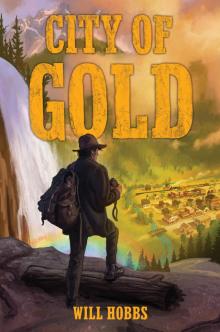 City of Gold
City of Gold Kokopelli's Flute
Kokopelli's Flute Take Me to the River
Take Me to the River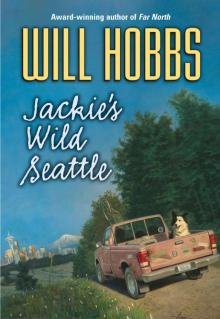 Jackie's Wild Seattle
Jackie's Wild Seattle The Maze
The Maze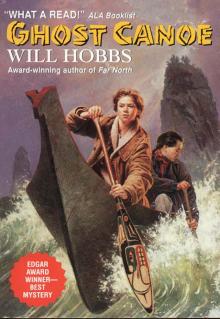 Ghost Canoe
Ghost Canoe Never Say Die
Never Say Die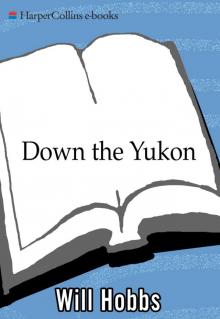 Down the Yukon
Down the Yukon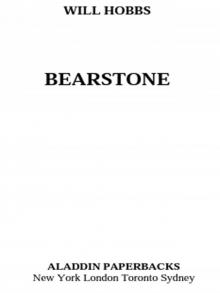 Bearstone
Bearstone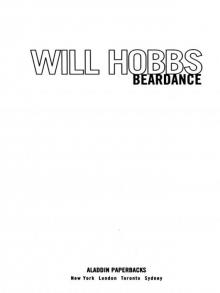 Beardance
Beardance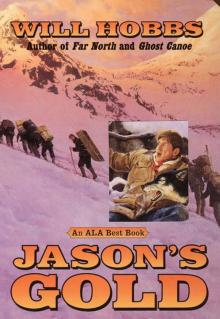 Jason's Gold
Jason's Gold Far North
Far North The Big Wander
The Big Wander River Thunder
River Thunder Downriver
Downriver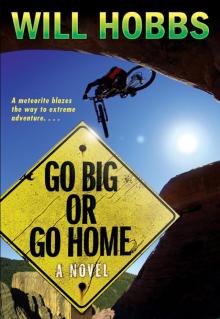 Go Big or Go Home
Go Big or Go Home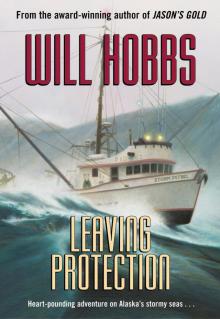 Leaving Protection
Leaving Protection Wild Man Island
Wild Man Island